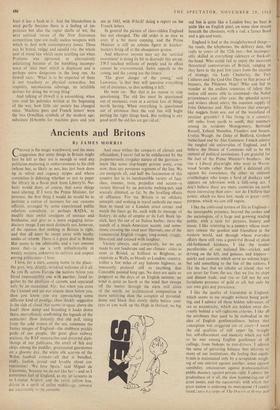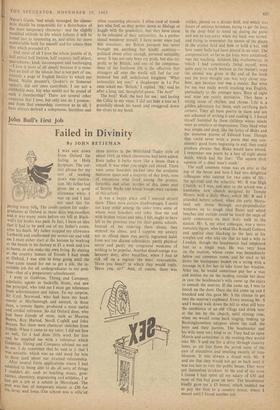Ancients and Britons
By JAMES MORRIS HANGE is the magic watchword, and the mere 1,_,suggestion that some things in Britain might best be left as they are is enough to send any politician muttering in embarrassment to his club (whose bar, as likely as not, has just been done up in velvet and regency stripes and whose committee is debating whether or not to paper the library in a floral pink from Liberty's). No- body would deny, of course, that some things need altering. If I were the Prime Minister, for instance, the first thing I would do would be to institute a course of manners for our customs officials, arranged by some experienced public relations consultant, or perhaps RADA, to modify their awful amalgam of menace and bonhomie, and give us a more engaging intro- ductory image. I am most distinctly not, however, of the opinion that nothing in Britain is right, and that all must be swept away with toothy smiles of reform. There is a great deal in Britain that seems to me admirable, and a vast amount more that--to use a verb unfashionable in weekly reviews, unknown to satirists and suspect among politicians—I love.
I love, for a start, coming home to the place: the grey, wry, drizzly, wrinkled welcome of it all. As you fly across Europe the nations below you blend imperceptibly one with another, fused to- gether by the abolition of carnets, and separated only by an occasional Alp : but when you cross
the Channel and see our islands there below you, then you know, you are approaching some different kind of prodigy. How thickly suggestive is the slab of cloud that seems to squat above the land! How damp and brooding it looks down
there, marvelously confirming the legends, of the
centuries! How instantly that old pall, rising from the cold waters of the sea, summons the fustier images of England—the stubborn prickly pride of our people; the great glass railway stations, the RAF moustaches and distorted diph- thongs of our publicans, the smell of fish and chips among the puddles, greatcoated guardsmen on a gloomy day, the white silk scarves of the Welsh football crowds—all that is bundled, stuffy, foolish, proud and lovable about our reputation! 'We love Spain,' said Miguel de
Unamuno, 'because we do not like her"--and so I sometimes feel of England, as my jet screams in to London Airport, and the rattly yellow bus, driven in a spirit of sullen middle-age, conveys me uncertainly to I he. customs.
And once within the ramparts of climate and officialdom, I never fail to be exhilarated by the preposterously irregular nature of the garrison— more like some slap-happy private army, even now, than any pompous regiment of the line. We are mongrels all, and half the fascination of this country lies in its inexhaustible variety of face, class, manner, taste, prejudice and accent—a variety blurred by no patriotic melting-pot, and scarcely dimmed, so far, by the levelling effects of affluence. For me Britain is an offshore entrepot, and nothing in travel enthrals me more than to stand on a London street corner and watch the faces go by, each with its message of history, its echo of empire or its Left Bank lip- stick, here the cut of an Italian barber, there the snatch of a mock-American accent, and some- times, crossing the road near Harrods, one of the immemorial English visages, long-nosed, craggy, blue-eyed and creased with laughter.
Variety always, and complexity, for we are made by our landscape and our climate: cities as stout as Bristol, as brilliant as Brighton, as exquisite as Wells,•as bloody as London; country, within a few miles of any hideous highway, as innocently pastoral still as anything that Constable painted long ago. No days are quite so poignant as the days of an English autumn; no wind is quite so harsh as the wind that sweeps off the moors through the stern mill cities of the north; no architectural composition is more satisfying than the complex of pyramid, dome and block that slowly shifts before your eyes as you walk up the High in Oxford; no big
red bus is quite like a London bus; no boat is quite like an English punt, on some slow stream beneath the chestnuts, with a rod, a James Bond and a gin-and-tonic..
England is bad at the straightforward things-- the roads, the telephones, the delivery date, the reply to yours of the '12th• inst.--‘-but incompar- ably skilled in everything sideways or back-of- the-hand. Who could fail to enjoy the incessant theoretical controversies of Britain, ranging as they have in the past few years from the niceties of strategy, via Lady Chatterley, the Two 'Cultures and the God Out There to that prince of hoaxers, the Piltdown Man'? Who can fail to wonder at the endless resources of talent this nation still seems able to command—the Nobel prizewinners year after year, the splendid actors and writers about otters, the constant supply of John Osbornes and Alan Sillitoes that emerges, like nuggets from ore, out of the wasteland of petulant grumble? I like living in a' country, 600 miles from north to south, that numbers among its residents Montgomery, Bertrand Russell, Yehudi Menuhin, Flanders and Swann, Evelyn Waugh, the Duke of Bedford, Graham Sutherland and Sir Alec Guinness. I much admire the tangled old universities of England, and I believe the House of Commons still to be the summit of political institutions. I am grateful for the fact of the Prime Minister's brothers: the 'one a Liberal playwright who went to Worm- wood Scrubs rather than shell a defeated city against his conscience, the other an eminent ornithologist who keeps a herd of donkeys and appears on television with a folk-song act. don't believe there are many countries on earth more interesting than ours: nor do I believe that power, which we have lost, made us great--only purpose, which we can still regain.
I like the cultivated texture of life in England— the inescapable presence, beyond the coshes and the sociologists, of a large and groWing reading public, with a taste for pictures, history and music. I like returning to a country whose man- ners remain the gentlest and friendliest in the western world, and through whose everyday affairs there still runs a poWerf ul thread of plain old-fashioned kindness. I like the insular peculiarities of our national lire—cricket, and driving on the left, and guineas, and kipper's-- quirks and customs which serve no solemn logic, but add something to the fun of the nations. I like the fact that we inhabit an island, that we are never far froM the sea; that we live by ships and distant trade, and rise or fall not by any fortuitous presence of gold or oil, but only by our own guts and prescience.
I like the quality of friendship in England, which .seems to me straight without being gush- ing, and I admire all those hidden tolerances. of sex or eccentricity, which are hidden away dis- creetly behind a self-rightexius exterior. I like all the attributes that used to be embodied in the idea of English gentlemanliness, before that conception was sniggered out of court—I mean the old qualities of still' upper lip, straight bat, self-effacement and modesty which are still to be met among English gentlemen of all callings, from bishops to taxi-drivers. I admire the sense of quivering balance that informs so manly of our institutions, the feeling that equili- brium is maintained only by a scrupulous \N cigh- ing of one interest against another, sense against sensibility, amateurism against professionalism. 'public decency against private right. t admire the gradualness of it all, the slow hammering-ow of great issues; and the equanimity with which this great nation is enduring its menopause iTrankly laced,' says thy copy of The I),)4 ,11 1,,,He find
Nurse's Guide, 'and wisely managed, the climac- teric should be responsible for a disturbance of the most temporary character: and the slightly modified attitude to life which follows it will be found just as interesting as, and often far more comfortable both for oneself and for others than that which preceded it').
And most of all I love the whole jumble of it, half proud half forlorn, half majestic half abject, quarrelsome, kind, inconsequent and unchanging —I love it most of all simply because it is mine. Not an inch of the islands that is not part of me, scarcely a page of English history to which my blood, Welsh peasant's, Quaker's or Somerset squire's, did not once contribute. I am not a clubbable man, but who would not be proud of such a membership? There are several other countries that I love, but only one do I possess: and from that ownership, common to us all, I have always derived a voluptuous, harmless and
often reassuring pleasure. I often read of travel- lers who feel, as they potter down to Malaga or haggle with the gondoliers, that they have cause to be ashamed of their nationality. As a profes- sional wanderer myself, I have never once had this sensation: my British passport has never brought me anything but kindly courtesy— political abuse often enough, personal antipathy never. It has not only been my pride, but also my profit to be British, and one of the compensa- tions of the footloose life is the affection that strangers all over the world still feel for our battered but still undefeated kingdom. 'What nationality are you?' a shopkeeper in La Paz once asked me. `British,' I replied. 'Ah,' said he after a long, sad, thoughtful pause. 'The best!'
The best? Well, the best for me: and having the Celtic in my veins, I did not hide a tear as I gratefully shook his hand, and swaggered down the street to my hotel.































































 Previous page
Previous page